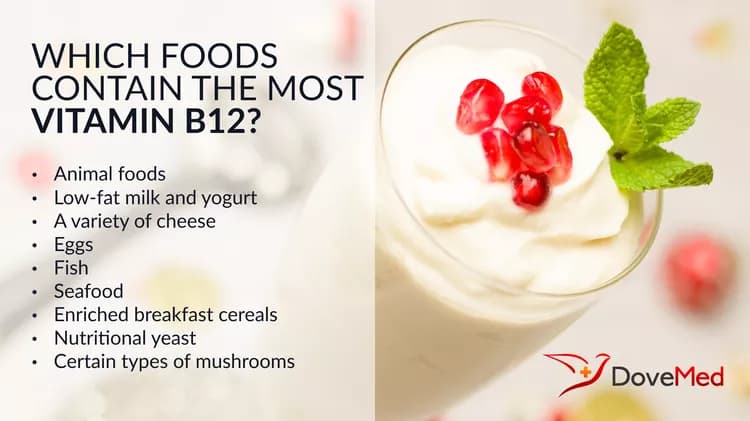The vitamin B-complex constitutes a set of 8 water-soluble vitamins that are essential to the human body for various metabolic functions, specifically cell metabolism. Each member of the vitamin B complex is denoted by a unique number and name. Vitamin B12 is known as cobalamin (also cyanocobalamin) and is an important component in the synthesis of DNA and RNA and for ensuring proper function of the cardiovascular system and brain and nervous system.
This nutrient offers a variety of health benefits including reducing heart disease risk, improving brain and nerve health function, prevention of depression, helping in the formation of red blood cells and consequently preventing anemia, and in converting carbohydrates, proteins, and fats to energy in the body. Vitamin B12 can also help treat and/or prevent conditions such as kidney disease, macular degeneration, migraine, multiple sclerosis, asthma, osteoporosis, and Alzheimer's disease.
Typically, only animal foods contain vitamin B12; plants are unable to produce the vitamin. Thus, vitamin B12 deficiencies are mostly noted in vegetarians; especially among vegans, who avoid all forms of animal foods. Individuals with pernicious anemia that cause injury to the stomach lining have difficulty in absorbing vitamin B12, leading to deficient body levels of the vitamin. Other conditions that affect the digestive tract, such as Helicobacter pylori infection, can also lead to poor intake of vitamin B12. Women on oral contraceptives and elderly adults have a higher risk for vitamin B12 deficiencies.
There is a wide range of animal foods that are sufficient natural sources of vitamin B12. Conventional cooking or boiling meat (for a long time) is known to cause dissolution and loss of this water-soluble vitamin, to some extent. An alternate solution is to steam cook food items or fry them with less oil, depending on the recipe/item being cooked.
Following is a list of foods that are high in vitamin B12 or cobalamin:
- Animal foods such as beef (including liver), pork (ham), lamb, turkey, and chicken
- Low-fat milk and yogurt
- A variety of cheese such as cottage, feta, etc.
- Eggs
- Fish that includes trout, sardines, salmon, cod, mackerel, tuna, haddock, etc.
- Seafood such as clams, scallops, shrimps, etc.
- Enriched breakfast cereals
- Nutritional yeast
- Certain types of mushrooms such as Crimini mushrooms
The Food and Nutrition Board at the National Academy of Sciences outlines the following recommendations for vitamin B12 intake. The recommended dietary allowances (RDA), or the average daily intake, to meet the body’s nutritional needs are as follows:
- Children:
- 6 months and younger - 0.4 micrograms/day
- Between 7-12 months - 0.5 micrograms/day
- 12 months to 3 years - 0.9 micrograms/day
- From 4 to 8 years - 1.2 micrograms/day
- From 9 to 13 years - 1.8 micrograms/day
- Adolescents and adults:
- Over 14 years - 2.4 micrograms/day
- Pregnant women and breastfeeding mothers - 2.6 and 2.8 micrograms/day respectively
It is evident from the list of various natural food sources of vitamin B12 that incorporating them into one’s daily diet is simple and beneficial. There is also no reported vitamin B12 toxicity from excess intake of the vitamin-rich foods. However, it is always recommended to take the advice of a suitable healthcare professional before bringing about any alteration to your regular food habits, such as incorporating more foods high in vitamin B12 and/or prior to taking any multivitamin supplements.
Related Articles
Test Your Knowledge
Asked by users
Related Centers
Related Specialties
Related Physicians
Related Procedures
Related Resources
Join DoveHubs
and connect with fellow professionals


0 Comments
Please log in to post a comment.